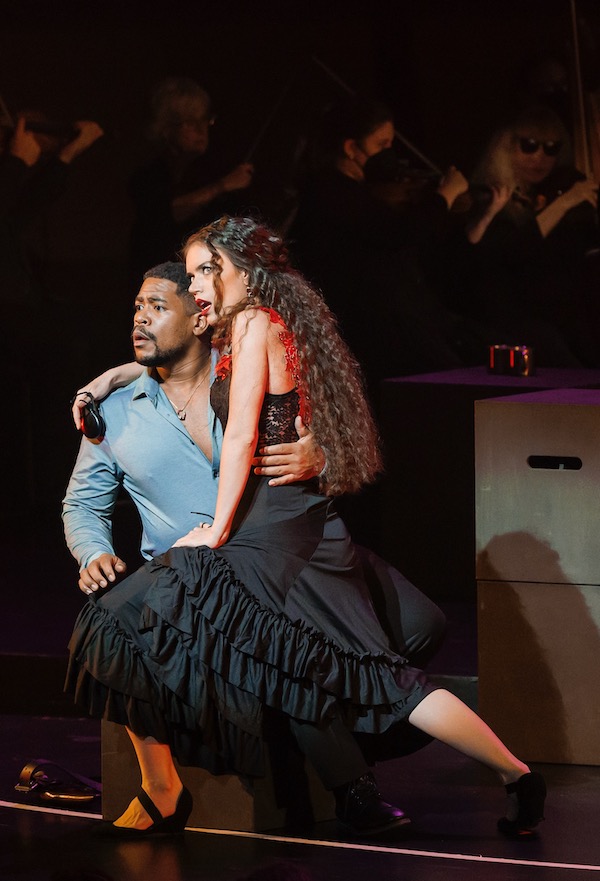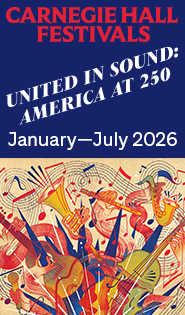MasterVoices gets up close and personal with “Carmen” in English

When people are learning about opera and its various genres, they often get stuck on the idea of opéra comique, of which Bizet’s Carmen is a prime example. What’s so comical about knife fights, moral degradation and the main character getting murdered at the end?
The same question bothered audiences—and even the director of the theater—when Carmen opened at Paris’s Opéra Comique in 1875. But thanks in part to the genre-stretching efforts of Bizet and his librettists Henri Meilhac and Ludovic Halévy, the term has come to mean a kind of realistic, approachable musical theater less bound by the conventions of grand opera.
That is the spirit in which the choral group MasterVoices presented Carmen in a lively performance Tuesday night in the Rose Theater of Jazz at Lincoln Center. The approachability factor was increased by the New York debut of a fresh English translation by Sheldon Harnick, the legendary lyricist of Fiddler on the Roof, She Loves Me, and other Broadway hits.
In the Rose Theater’s intimate space, one could get a sense of what this piece of music theater sounded like with its spoken dialogue in the audience’s own language, and without the sung recitatives later added—not, sadly, by Bizet, who died unexpectedly during the show’s initial run—to make the grander opera commonly heard today.
MasterVoices artistic director Ted Sperling conducted the Orchestra of St. Luke’s onstage, upstage of the action, opening the show in a burst of cymbals, timpani and piccolo that epitomized the bull ring and amorous passions. Dancer Camila Cardona, in black leotard with red horns, sparred with a caped Isaac Tovar in the first of several dance numbers, choreographed by Gustavo Zajac and artfully woven through the stage action.
Some listeners in 1875 complained that Bizet’s colorful orchestration was insufficiently deferential to the singers, but under Sperling on Tuesday it proved a supportive partner, as he skillfully managed the interaction of voices with woodwinds and strings.
Mezzo-soprano Ginger Costa-Jackson portrayed a Carmen who could fell a man with a glance (or a tossed flower), her dark voice curling around the vocal lines with power in reserve. There have been more melodramatically defiant performances of the role, but this one seemed just right to be seen up close in the Rose. There was even a touch of humor in her banter with the other cigarette girls and hasty primping for an encounter with her toreador.
Tenor Terrence Chin-Loy brought lots of vocal muscle to the role of Don Jose. His singing and acting seethed with desperation and indignation, as the temptress seduced him into deserting his unit and taking up a life of crime. It wasn’t necessary to add a slightly stooped posture and shuffling gait to brand him a “loser” compared to his rival Escamillo. The sense of a fine man brought low was lost in the process.
Mikaela Bennett gave her namesake—the innocent, Jose-smitten Micaela–a fine clear soprano that couldn’t avoid some screechiness in the taxing high notes. Again, the character’s babe-in-the-woods persona would have been clear enough without the Dorothy-style braids.
John Brancy’s rock-ribbed baritone gave the toreador Escamillo plenty of heft, and the singer carried himself with rock-star arrogance. But one doesn’t think of toreadors smiling and waving that much to their fans, and a touch more hauteur would have added to his confrontations with Don Jose.
Leo Radosavljavic brought sturdy vocal and physical presence to the mostly plot-advancing role of the lieutenant Zuniga. Michael Kelly’s soldier Morales in Act I was intelligible and direct, requiring no resort to the supertitles (often a necessity even when sung in English), and he made a dashing smuggler Dancairo in Acts II and III.
In other roles, William Ferguson as the smuggler Remendado, Paula Mermelstein as the tavernkeeper Lillas Pastia, and Kimberly Sogioka as Carmen’s companion Mercedes all inhabited their roles convincingly and helped keep the action going. Nicole Fernandez-Coffaro impressed particularly with her rich soprano as Carmen’s other friend Frasquita.
The red-horned dancer Cardona—bull or devil, one often wondered which—commented sinuously on the action from time to time. In the closing moments, choreographer Zajac gave her and Brancy’s matador a powerful bull-ring pantomime that meaningfully echoed, but also distracted from Carmen’s murder downstage.
The MasterVoices Chamber Chorus sang and acted splendidly, whether portraying squabbling cigarette girls or a hankie-waving crowd at a bullfight.
Dancers Tovar and Laura Peralta paired up impressively for a fiery flamenco to introduce Act II and a more balletic interpretation of Act III’s pastoral prelude.
Scenery was minimal—a circular platform, a few movable boxes to sit on—but scenic designer Ann Beyersdorfer did score a “found scenery” coup by casting the theatre’s audience seating above and behind the stage as a bull-ring, decking it with flags, and seating the chorus there for the climactic Act IV. Brian Tovar lit the singers well, and his lighting designs evoked smugglers’ cave as well as sun-drenched stadium.
Famous as a lyricist, Harnick has also been active as a translator (including Fiddler into Yiddish), and his Carmen version was a model of clarity and frank expression.
Director Sammi Cannold’s concept of Carmen as accessible, high-impact musical theater with framing dances (instead of the dubiously relevant ballets that some productions inserted in the 1800s) came off with hardly a hitch, making the familiar seem startlingly new.
MasterVoices presents “O How Good,” conducted by Ted Sperling, with baritone Justin Austin, cantor Daniel Mutlu, and organist David Strickland in sacred works by Bloch, Weill, and Daniel Rein, 7:30 p.m. March 23, 2023 at Central Synagogue, Manhattan. mastervoices.org.


